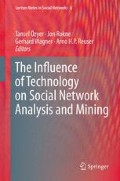Abstract
An Internet forum is a Web application for publishing user-generated content under the form of a discussion. The most important feature of Internet forums is their social aspect. Many forums are active for a long period of time and attract a group of dedicated users, who build a tight social community around a forum. With great abundance of forums devoted to every possible aspect of human activity, such as politics, religion, sports, technology, entertainment, economy, fashion, and many more, users are able to find a forum that perfectly suits their needs and interests. Communities of users forming around popular Internet forums undergo an evolution over time. Some Internet forums become more dense and saturated with users, some Internet forums dissolve in broader discussion topics. Forums can differ in ways they attract new users, maintain current users or decay in membership and posting intensity. In this paper we introduce a micro-community-based model for measuring the evolution of Internet forums. We show how simple concept of a micro-community can be used to quantitatively assess the openness and durability of an Internet forum. We also show that our model is capable of producing a taxonomy of Internet forums using unsupervised clustering method. We present the micro-community model, the set of basic statistics, and we apply the model to several real-world online forum communities to experimentally verify the correctness and robustness of the model.
Access this chapter
Tax calculation will be finalised at checkout
Purchases are for personal use only
References
Agrawal, R., Srikant, R.: Fast algorithms for mining association rules. In: Bocca, J.B., Jarke, M., Zaniolo, C. (eds.) Proceedings of the 20th International Conference on Very Large Data Bases, VLDB, pp. 487–499. Morgan Kaufmann, Hove (1994)
Alm, C.O., Roth, D., Sproat, R.: Emotions from text: machine learning for text-based emotion prediction. In: Proceedings of Human Language Technology Conference and Conference on Empirical Methods in Natural Language Processing, Vancouver, pp. 579–586. Association for Computational Linguistics, East Stroudsburg, (2005)
Brandes, U., Erlebach, T.: Network Analysis. Methodological Foundations. Lecture Notes in Computer Science, vol. 3418. Springer, Berlin/New York (2005)
Carrington, P.J., Scott, J., Wasserman, S.: Models and Methods in Social Network Analysis. Cambridge University Press, Cambridge (2005)
Faust, K., Skvoretz, J.: Comparing networks across space and time, size and species. Sociol. Methodol. 32, 267–299 (2002)
Feldman, R., Sanger, J.: The Text Mining Handbook: Advanced Approaches in Analyzing Unstructured Data. Cambridge University Press, Leiden (2006)
Fisher, D., Smith, M., Welser, H.T.: You are who you talk to: detecting roles in usenet newsgroups. In: HICSS ’06: Proceedings of the 39th Annual Hawaii International Conference on System Sciences, vol. 3, p. 59b. IEEE Computer Society, Washington, DC (2006)
Golder, S.: A typology of social roles in usenet. Ph.D. thesis, Harvard University (2003)
Hanneman, R.A., Riddle, M.: Introduction to Social Network Methods. University of California, Riverside (2005)
Manning, C.D., Schuetze, H.: Foundations of Statistical Natural Language Processing, 1 edn. MIT, Cambridge (1999)
Marcoccia, M.: On-line polylogues: conversation structure and participation framework in internet newsgroups. J. Pragmat. 36(1), 115–145 (2004)
Merton, R.K.: Social Theory and Social Structure. Free Press, New York (1968)
Parsons, T.: The Social System, 2nd edn. Routledge, London (1991)
Turner, T.C., Smith, M.A., Welser, H.T.: Picturing usenet: mapping computer-mediated collective action. J. Comput. Mediat. Commun. 10(4), 1–24 (2005)
Viegas, F.B., Smith, M.: Newsgroup crowds and AuthorLines: visualizing the activity of individuals in conversational cyberspaces. In: Proceedings of the 37th Annual Hawaii International Conference on System Sciences, 2004, pp. 10. IEEE Computer Society, Los Alamitos (2004)
Weiss, S., Indurkhya, N., Zhang, T., Damerau, F.: Text Mining: Predictive Methods for Analyzing Unstructured Information. Springer, New York (2004)
Welser, H.T., Gleave, E., Fisher, D., Smith, M.: Visualizing the signatures of social roles in online discussion groups. J. Soc. Struct. 8(2), 564–586 (2007)
Wenger, E.: Communities of Practice: Learning, Meaning, and Identity, 1 edn. Cambridge University Press, Cambridge/New York (1998)
Wenger, E., Snyder, W.M.: Communities of practice: the organizational frontier. Harvard Bus. Rev. 78(1), 139–146 (2000)
Wenger, E., Mcdermott, R., Snyder, W.: Cultivating Communities of Practice: A Guide to Managing Knowledge. Harvard Business School, Boston (2002)
Acknowledgements
Research supported by the Polish Ministry of Science grant N N516 371236.
Author information
Authors and Affiliations
Corresponding author
Editor information
Editors and Affiliations
Rights and permissions
Copyright information
© 2013 Springer-Verlag Wien
About this chapter
Cite this chapter
Morzy, M. (2013). Evolution of Online Forum Communities. In: Özyer, T., Rokne, J., Wagner, G., Reuser, A. (eds) The Influence of Technology on Social Network Analysis and Mining. Lecture Notes in Social Networks, vol 6. Springer, Vienna. https://doi.org/10.1007/978-3-7091-1346-2_27
Download citation
DOI: https://doi.org/10.1007/978-3-7091-1346-2_27
Published:
Publisher Name: Springer, Vienna
Print ISBN: 978-3-7091-1345-5
Online ISBN: 978-3-7091-1346-2
eBook Packages: Computer ScienceComputer Science (R0)

